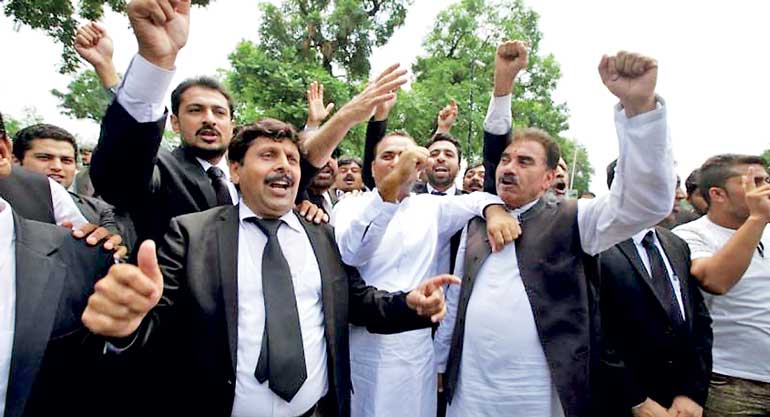Monday Feb 23, 2026
Monday Feb 23, 2026
Tuesday, 18 July 2017 00:00 - - {{hitsCtrl.values.hits}}
 Lawyers chant slogans against Prime Minister Nawaz Sharif during Panama leaks hearing outside Supreme Court in Islamabad, Pakistan July 17, 2017. Reuters
Lawyers chant slogans against Prime Minister Nawaz Sharif during Panama leaks hearing outside Supreme Court in Islamabad, Pakistan July 17, 2017. Reuters
ISLAMABAD (Reuters): Pakistan’s Supreme Court on Monday began hearings that will decide the future of Prime Minister Nawaz Sharif, who is fighting for his job and contesting a damning corruption report by an investigative panel.
The Supreme Court is expected to either put Sharif on trial on corruption charges, or even disqualify him, but few expect the judges to dismiss the case after the panel tabled a damaging 254-page report into his family wealth.
Sharif has denied any wrongdoing after the report alleged his family’s vast wealth was beyond their means, and accused his children, including presumed heir Maryam, of signing forged documents to obscure ownership of posh London flats.
Sharif, 67, has rejected demands by opposition parties to resign, warning his ouster would destabilise the country and imperil hard-won economic gains since his poll victory in 2013.
“It hurts that despite of our hard work, attempts are afoot once again to push the country back,” Sharif told a meeting of his ruling PML-N parliamentary party over the weekend.
Sharif in April narrowly escaped disqualification after the Supreme Court ruled there was insufficient evidence to remove him – by a 2-3 split – over documents released by the Panama Papers leak into off-shore wealth.
But it ordered further investigations, and the formation of the Joint Investigation Team (JIT) panel.
Sharif has talked of a conspiracy against him, but has not named anyone. His allies, however, privately claim that elements of Pakistan’s powerful military and the judiciary are bent on toppling him.
The army spokesman brushed aside questions about claims the military’s hidden hand was the driving force behind the JIT probe, saying “the Pakistan army is not directly connected”.
The six-person JIT panel included one member from the military intelligence agency and another from the powerful Inter-Services Intelligence directorate, the country’s top spy agency.